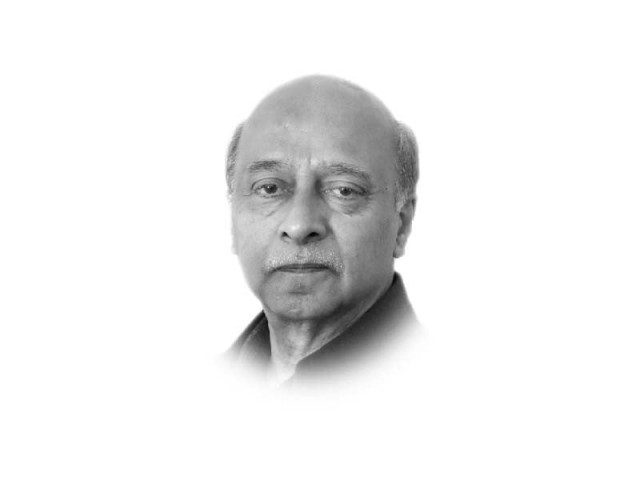Something is wrong with our power centres
You are a demigod as long as in power and a criminal outcast the moment you hit the road

Juxtapose the post-1947 socio-economic evolution of India and Pakistan, the former has joined or partnered (as special observer) with almost all global leagues like G-20, QUAD and BRICS. It basks in glory as Vice President Kamla Harris waits in the wings to become the US President sooner or later, and Rishi Sunak is the Lord of the 10 Downing Street that once lorded over the Indian Sub-continent. Both leaders are of Indian heritage. What a stupendous journey and enviable linkage of the present day India to its diaspora in the most important countries!
In contrast, what an awful and mediocre run of events here in Pakistan — political stagflation if not regression; economic adversity that has made the country bend forwards and backwards for a few billion dollars from the IMF; vilification of a former prime minister, his associates and supporters within the bar, businesses and media; punitive measures ranging from contempt of court, sedition and terrorism charges to administrative actions and explanations for acts performed in accordance with the legal mandate of the office.
What does it imply? You are a demigod as long as in power and a criminal outcast the moment you hit the road.
Doesn’t the string of criminal cases against Khan, his colleagues and media persons, including Arshad Sharif, amount to making fun of Pakistan as a state that turns former prime ministers into criminals the moment they are out of power? This draws questions on those who control the state: how can one become a criminal in one instance and turn kosher, acceptable in the next (read several PDM leaders including PM Sharif)? This reflects extremely poorly on those who glorify or vilify critical stakeholders of the system, essentially personal bloated egos at work to the total disregard for how it tarnished the image of the country.
I find it irresistible to reproduce what I had told the Reuters News agency back in June 2010, when its correspondent asked about the floating “conspiracy theories about India, often linked to the United States”.
“The more you lose on the economic front, on bad governance, the more you tend to externalise your problems and fears,” was my response.
The same Reuters story had quoted President Barack Obama’s frustration over Pakistan early that year when he said that “[Pakistan’s] obsession with India as the mortal threat to Pakistan has been misguided ... their biggest threat right now comes internally.”
More than twelve years on, Pakistan has hardly changed and seems to have hit the ground both on economic and political fronts, with the heads of the most powerful institutions going public (on October 27) to dump the blame of the “entire mess” on one person alone — as if this country never had an Ayub Khan, Yahya Khan, Ziaul Haq or Musharraf. Nor did Sharifs and Zardaris — equally ostracised politicians — ever exist in the country.
With this nearly two hour long press talk, Pakistan in fact created a new record with an uneasy, visibly tense spy chief telling the country through the media that he was forced to go public and “confront phony and misguiding lies aimed at spreading anarchy”. A self-defeating exercise indeed, as nowhere in the world does the public at large trust intelligence agencies — however truthful and right they may be. Did the top spy breach the Official Secrets Act by divulging some content of the two meetings between the President, the Army Chief, himself and Imran Khan?
Military and intelligence establishments at best work behind the scenes. This also serves as the best insulation against public censure. But here — their claims to neutrality notwithstanding — the two officials blew that cover with their questionable postulations and responses to mostly benign questions, typically scapegoating consequences of their policies on an individual. Some times that individual is Nawaz Sharif, another time it is Imran Khan and generally it is the “incompetent civilians”.
Also, was it really something new when both Generals called out the former prime minister for his “incompetence and flaws?” Even more ironical — the latest statement by Prime Minister Shehbaz Sharif is not less than indictment when he told a group of journalists that the establishment raised and fed the favourite (Imran Khan).
Equally upsetting is the contradiction in ISPR’s two statements (currently circulating on social media); following a meeting of the national security committee and before the vote of no-confidence on April 9. The chief of the military’s media wing had then told the media that the content of the cypher from Washington amounted to interference. But on October 27, he implied that the allegations (Khan) made based on the cypher were nowhere near the truth.
Almost all army chiefs — from Ayub Khan to Ziaul Haq and Musharraf — often publicly and privately blamed governance failures on civilian prime ministers. But does this really hold any water with two power centres in Rawalpindi and Islamabad respectively, with the former every now and then turning the heat on the latter?
Published in The Express Tribune, November 8th, 2022.
Like Opinion & Editorial on Facebook, follow @ETOpEd on Twitter to receive all updates on all our daily pieces.













COMMENTS
Comments are moderated and generally will be posted if they are on-topic and not abusive.
For more information, please see our Comments FAQ